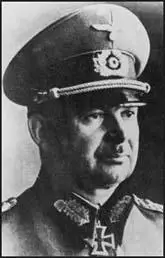Kurt Zeitzler

Kurt Zeitzler, the son of a pastor, was born in Cossmar-Luckau, Germany on 9th June, 1895. He joined the German Army and during the First World War commanded an infantry battalion.
Zeitzler remained in the army and became one of the early supporters of Adolf Hitler and the Nazi Party. In 1934 he joined the first panzer forces and by 1938 had reached the rank of lieutenant colonel.
On the outbreak of the Second World War Zeitzler was in the 14th Army and served under General Siegmund List during the invasion of Poland. In 1940 he was appointed as chief of staff to General Paul von Kleist and saw action in France in 1940. He held this position with Kleist in Greece and in the Soviet Union.
In January 1942, Zeitzler became chief of staff to General Gerd von Rundstedt and played an important role in defeating the Allies at Dieppe on 19th August. Adolf Hitler heard good reports of Zeitzler and considered appointing him to a senior post at GHQ. Despite objections from Wilhelm Keitel and Alfred Jodl, Hitler decided in September 1942 that Zeitzler should replace General Franz Halder as Chief of General Staff.
At first Zeitzler went along with Hitler's military decision but the two clashed over his "no withdrawal" policy in the Soviet Union. Zeitzler attempted to resign after the disaster at Stalingrad but Hitler refused to accept it. After further disagreements Zeitzler claimed ill-health and on 20th July 1944, left office. Hitler was furious and dismissed him from the German Army. Kurt Zeitzler died on 25th September 1963.
Primary Sources
(1) William L. Shirer, The Rise and Fall of the Third Reich (1959)
The Russian objective was obvious to anyone who looked at a map and especially obvious to Zeitzler who, from Army intelligence, knew that the enemy had massed thirteen armies, with thousands of tanks, in the south to achieve it. The Russians were clearly driving in great strength from the north and the south to cut off Stalingrad and to force the German Sixth Army there to either beat a hasty retreat to the west or see itself surrounded. Zeitzler later contended that as soon as he saw what was happening he urged Hitler to permit the Sixth Army to withdraw from Stalingrad to the Don bend, where the broken front could be restored. The mere suggestion threw the Fuehrer into a tantrum.
'I won't leave the Volga! I won't go back from the Volga!' he shouted, and that was that. This decision, taken in such a fit of frenzy, led promptly to disaster. The Fuehrer personally ordered the Sixth Army to stand fast around Stalingrad.
Hitler and his staff returned to headquarters on November 22. By this time, the fourth day of the attack, the news was catastrophic. The two Soviet forces from the north and south had met at Kalach, forty miles west of Stalingrad on the Don bend. In the evening a wireless message arrived from General Paulus, commander of the Sixth Army, confirming that his troops were now surrounded. Hitler promptly radioed back, telling Paulus to move his headquarters into the city and form a hedgehog defence. The Sixth Army would be supplied by air until it could be relieved.
But this was futile talk. There were now twenty German and two Rumanian divisions cut off at Stalingrad. Paulus radioed that they would need a minimum of 750 tons of supplies a day flown in. This was far beyond the capacity of the Luftwaffe, which lacked the required number of transport planes. Even if they had been available, not all of them could have got through in the blizzardly weather and over an area where the Russians had now established fighter superiority. Nevertheless, Goering assured Hitler that the Air Force could do the job. It never began to.
(2) Albert Speer, Inside the Third Reich (1970)
Hitler now commanded units to be detached from all other sectors of the front and from the occupied territories and dispatched in all haste to the southern sector. No operational reserve was available, although General Zeitzler had pointed out long before the emergency that each of the divisions in southern Russia had to defend a frontal sector of unusual length and would not be able to cope with a vigorous assault by Soviet troops.
Stalingrad was encircled. Zeitzler, his face flushed and haggard from lack of sleep, insisted that the Sixth Army must break out to the west. He deluged Hitler with data on all that the army lacked, both as regards to rations and fuel, so that it had become impossible to provide warm meals for the soldiers exposed to fierce cold in the snow-swept fields or the scanty shelter of rums. Hitler remained calm, unmoved and deliberate, as if bent on showing that Zeitzler's agitation was a psychotic reaction in the face of danger. 'The counterattack from the south that I have ordered will soon relieve Stalingrad. That will recoup the situation. We have been in such positions often before, you know. In the end we always had the problem in hand again." He gave orders for supply trains to be dispatched right behind the troops deploying for the counteroffensive, so that as soon as Stalingrad was relieved something could at once be done about alleviating the plight of the soldiers. Zeitzler disagreed, and Hitler let him talk without interrupting. The forces provided for the counterattack were too weak, Zeitzler said. But if they could unite successfully with a Sixth Army that had broken out to the west, they would then be able to establish new positions farther to the south. Hitler offered counter arguments, but Zeitzler held to his view. Finally, after the discussion had gone on for more than half an hour. Hitler's patience snapped: "Stalingrad simply must be held. It must be; it is a key position. By breaking traffic on the Volga at that spot, we cause the Russians the greatest difficulties."
